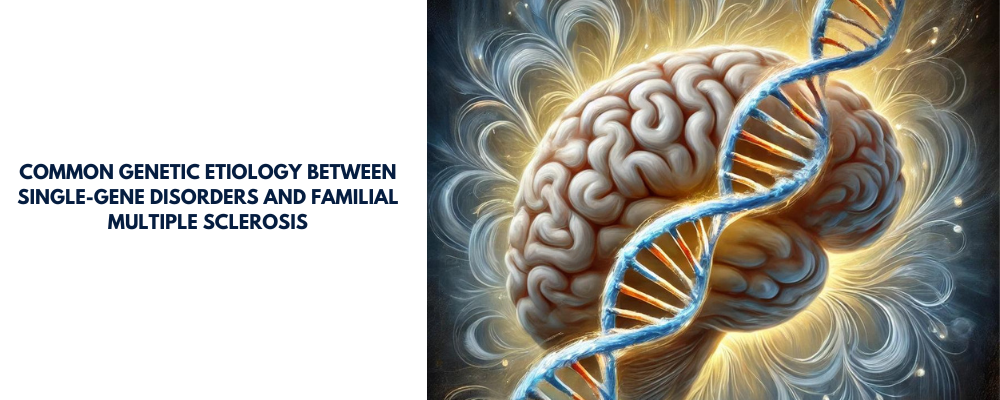Common Genetic Etiology Between Single-Gene Disorders and Familial Multiple Sclerosis

Multiple sclerosis (MS) is a complex immune-mediated neurodegenerative disease affecting over two million people worldwide. It primarily targets the central nervous system (CNS), leading to progressive neurological impairment characterized by myelin loss and axonal degeneration. Symptoms can include vision problems, balance issues, cognitive decline, and mobility challenges. While genetic and environmental factors contribute to MS susceptibility, recent studies suggest that some cases of familial MS may share genetic variations with certain Mendelian single-gene disorders, which manifest symptoms resembling those seen in MS patients.
This study aimed to investigate whether there is a shared genetic etiology between familial MS and Mendelian single-gene disorders that exhibit overlapping clinical and radiological features with MS. By focusing on 28 candidate genes associated with these disorders, the researchers examined exome sequencing data from 270 MS patients to identify rare genetic variants. These variants were subsequently genotyped in a larger cohort of 2,131 MS patients and 830 healthy controls to assess their segregation with MS within families.
Key Findings
The study identified nine rare variants in six genes that segregated with MS in 13 families. Notably, these variations were observed in genes responsible for various disorders, including cerebroteninous xanthomatosis (CYP27A1), Chediak-Higashi syndrome (LYST), and pyruvate dehydrogenase deficiency (PDHA1). Importantly, four different variations were found in the CYP27A1 gene, a gene linked to cholesterol metabolism, highlighting its potential role in MS pathology.
CYP27A1 Variations and Cholesterol Dysregulation in MS
The researchers identified four CYP27A1 variations in MS patients, including a pathogenic variant (p.R405W) known to cause cerebroteninous xanthomatosis (CTX) in its homozygous or compound heterozygous form. Interestingly, in the heterozygous state, this variant was found in six individuals from a multi-incident family, three of whom were diagnosed with MS. This finding points to the possibility that variations in cholesterol metabolism pathways, specifically those affecting oxysterol synthesis, may contribute to MS susceptibility, particularly in progressive forms of the disease.
LYST and Chediak-Higashi Syndrome: A New MS Subtype?
The study also identified a LYST variant (p.V1678A) in five MS patients across three families. LYST variations typically cause Chediak-Higashi syndrome (CHS), a lysosomal storage disorder associated with immune dysfunction. However, the patients in this study did not exhibit classical CHS symptoms, suggesting that the p.V1678A variant might represent a new phenotype with an MS-like presentation, further underscoring the complexity of MS genetics.
PDHA1 and Energy Metabolism in MS
variations in PDHA1, which encodes a key enzyme in the pyruvate dehydrogenase complex, were found in MS patients from three families. PDHA1 variations typically cause pyruvate dehydrogenase deficiency, which can result in severe neurological and metabolic disorders. The identification of a novel PDHA1 variant (p.K387Q) in MS patients suggests a potential link between energy metabolism and MS pathophysiology, particularly regarding mitochondrial function and cholesterol biosynthesis.
Implications
This study suggests that in a subset of MS patients, rare genetic variations, particularly those involved in cholesterol metabolism and lysosomal function, may contribute significantly to disease onset and progression. The identification of shared variations between MS and other single-gene disorders provides new insights into the molecular mechanisms underlying MS and highlights the importance of studying familial forms of the disease to uncover rare variants that may have a significant impact on susceptibility.
The findings underscore the role of cholesterol metabolism, especially the production of oxysterols, in MS pathology. Given that oxysterols regulate immune cell function and are implicated in neurodegenerative processes, their dysregulation could be a critical factor in the development of progressive MS. The study also raises intriguing questions about the potential for heterozygous variations in single-gene disorders to manifest as MS or other neurological diseases, a hypothesis that warrants further investigation.
Conclusion
The discovery of rare genetic variants in CYP27A1, LYST, and PDHA1 among MS patients suggests that MS may share a common genetic etiology with certain Mendelian disorders. These findings not only deepen our understanding of the genetic underpinnings of MS but also open new avenues for personalized treatment approaches targeting metabolic pathways. Further research is needed to validate these findings and explore their potential clinical applications, particularly in the context of progressive MS forms.
Reference:
Traboulsee, A. L., Sadovnick, A. D., Encarnacion, M., Bernales, C. Q., Yee, I. M., Criscuoli, M. G., & Vilariño-Güell, C. (2017). Common genetic etiology between “multiple sclerosis-like” single-gene disorders and familial multiple sclerosis. Human Genetics, 136, 705–714.
